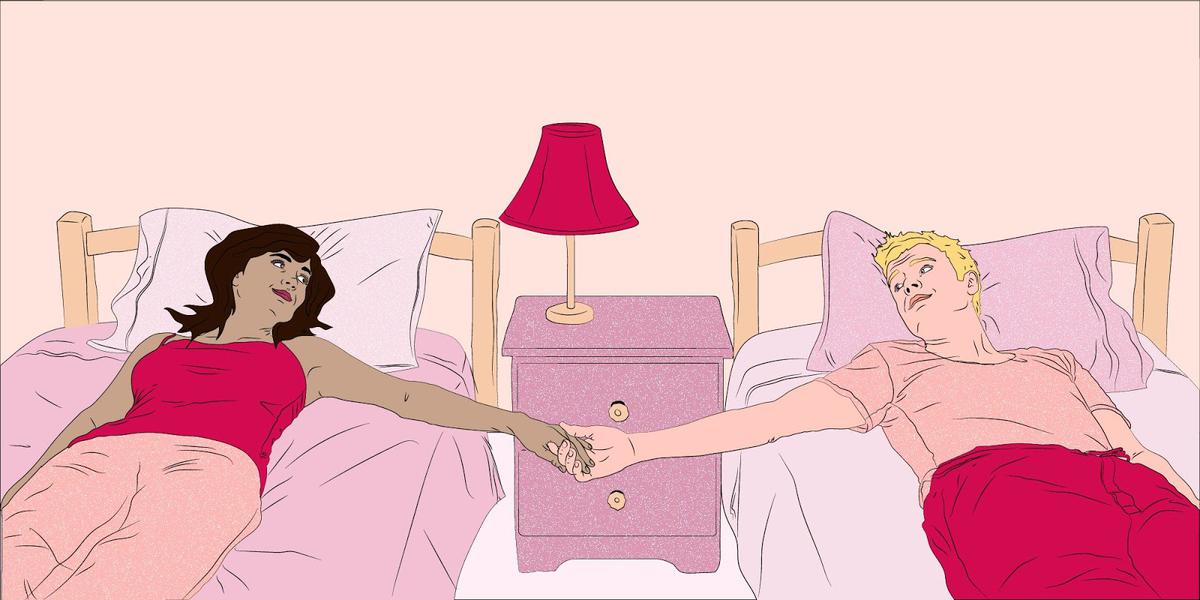Co-sleeping with someone takes some getting used to. Unless you were accustomed to sleeping with your siblings in childhood or have had less-comfortable sleeping arrangements throughout your life, you might find it challenging to share your bed. However, there's an unwritten rule that couples should sleep together. While there are numerous benefits to sleeping in the same bed as the person you love, there are notable advantages when it comes to sleeping in separate beds, if not even different rooms as well.
A good night's sleep is not optional. We all need it to function properly and enjoy our days to the fullest. That's why it's important to weigh your options and discuss them with your partner if you want something to change.

The Habit of Sleeping Together Explained
The habit of couples sleeping together, in the same bed, became popular in the Industrial Age. It wasn't only because they didn't have enough room to sleep separately, but also because of safety reasons, and to keep each other warm. Due to these sleeping arrangements, there were hardly any couples who slept separately, something that has misled people to believe that if it happened, it could be a sign of trouble. Even so, they enjoyed the advantages of co-sleeping and tried to deal with the shortcomings in their own way.
Among the benefits of sharing the same bed with your beloved are lower cortisol levels, especially in women. Cortisol is a stress hormone, and higher levels of cortisol are definitely undesirable. When its levels decrease, people fall asleep faster and wake up less frequently during the night.
Sleeping together with your partner sends a powerful emotional message as well, mainly due to the release of another hormone called oxytocin. Oxytocin is also called 'the love hormone,' and it is responsible for feelings of love, well-being, and bonding.
Apart from the scientific evidence, it is worth mentioning that when we sleep as a couple, we feel safer at night. It's not just about emotional security. It is also about physical safety, something which is important for older people. There are many cases of couples who suffered various attacks while sleeping, and the rapid action of their partners allowed them to get medical care on time.
The Habit of Sleeping Separately Explained
According to a study done by the National Sleep Foundation, 1 in 4 couples choose individual sleep. Dr. Neil Stanley, a sleep expert at the University of Surrey, explains why: "It's not surprising that people are disturbed by sleeping together. Sleep is the most selfish thing you can do, and it's vital for good physical and mental health. Sharing the bed space with someone who is making noises and who you have to fight with for the duvet is not sensible. If you are happy sleeping together, that's great, but if not, there is no shame in separate beds."
The most frequent reasons that couples switch from co-sleeping to sleeping individually are due to different sleep schedules, unmatched preferences when it comes to room temperature and mattress type. There can also be incompatibilities regarding pre-sleep activities, the occurrence of various noises during the night, such as snoring, and restless sleeping.
While there's no accurate indication regarding when sleeping in separate rooms became a trend, there are plenty of celebrity couples who embraced this change and were happy with it, such as Katie Holmes and Tom Cruise, and Scott Disick and Kourtney Kardashian. In the case of Kevin Jonas and Danielle Deleasa, for example, the couple chose individual sleep due to Kevin's snoring problem.
The Benefits of Sleeping Separately When Coupled

1. You will sleep better
According to David Bennett, a certified counselor, and author, co-sleeping means that you and your partner wake each other up six times per night, on average, as a result of snoring, kicking, bumping, and other similar actions. In the absence of your partner in the same bed or even the same room, you will be able to decide when you sleep, what you do before falling asleep, whether you want a light to stay on or sleep in a dark room, which temperature to set, and so on. You will be responsible for creating the perfect environment for rest, which in turn means that you will sleep better.
2. Your body will look better
Intimacy Expert, Miyoko Rifkin, warns us that if we don't get enough quality sleep, we will get fat. More specifically, our mid-section will not look as appealing as it is without working out because that's where fat is primarily deposited. Also, a good night's sleep reduces dark circles and contributes to our overall well-being as sleep helps your body repair itself.
3. You will enjoy less conflict
When you choose to sleep separately, you will fight less with your special someone. The explanation is simple. A good night's sleep will make you feel rested, refreshed, and less moody. In turn, you will feel less irritable and less on edge. All these contribute to much better conflict resolution if any conflict even exists.
4. You will not take your partner's presence for granted
If your partner isn't by your side every night, you will no longer take their presence for granted. You will seek their company and cherish the moments spent together. The saying "you don't know what you've got until it's gone" applies here to some extent. The result will be intentional interactions between the two of you, not unintentional ones due when sharing a bed. You will actually miss them, which benefits the closeness between the two of you.
5. You will no longer feel resentment
Resentment is an awful feeling, and it should be avoided at all costs in a relationship. It occurs because we get frustrated while we try to deal with something that bothers us. Your partner's snoring, for example, could annoy you so much in time, that it will cause you to resent them. Even if you understand the snoring isn't intentional, you still end up upset because it stops you from resting well. When you choose to sleep in separate rooms, this problem goes away.
The Effects of Individual Sleep on Intimacy
Experts agree that the effects of individual sleep on intimacy are positive. On the one hand, they think it takes the pressure off having intercourse before going to bed when both of you are tired and not really in the mood, but at the same time, no one wants their partner to feel rejected.
On the other hand, they emphasize that sleeping separately may enliven your intimate life, as it introduces a sense of novelty and intrigue, and makes you remember how exciting it was to get physical with your partner at the beginning of your relationship.
According to intimacy expert Miyoko Rifkin, "Saving sexy time for your waking hours will result in more passionate, energetic encounters."
Even so, you and your partner will have to come up with a plan. You can either agree on specific times to have intercourse, something which will build anticipation, although you might think it's dull. Or, you can decide to be spontaneous and join each other in bed whenever you feel like cuddling, being affectionate, and more.
Individual Sleep Terms and Compromises
My partner is a restless sleeper, and maybe so is yours. In this case, what we can do is address the issue. Experts warn us that our partners may not be as excited about sleeping separately as we are. If your partner is resentful of your desire to sleep separately, it's worth talking about their reasons and making compromises.
For example, you could agree to co-sleeping during weekends and sleeping apart during workdays. Or, you could implement the "open-door policy," which means that whenever one of you needs the physical presence of the other, you can freely join them in their room. However, you don't have to take this policy literally, meaning you don't have to keep the room's door open at all times if you are a light sleeper. It refers to both of you knowing that you're welcome at any time.

Final Thoughts
There are arguments in favor of co-sleeping, as well as individual sleeping when coupled. It is ultimately up to you and your partner to decide which one is more favorable for your relationship. However, keep in mind that bad quality sleep affects your life on all levels, including the relationship you have.
